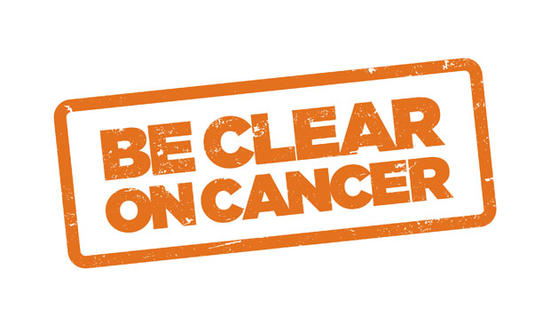Bowel cancer screening campaign: Wales

Support the campaign
Get essential information and find out how you can support bowel screening.
Cancer Research UK and Public Health Wales launched a Be Clear on Cancer, Bowel Cancer Screening campaign across Wales between 5 February to 31 March 2018.
The aim of the campaign was to raise awareness of the NHS Wales Bowel Cancer Screening Programme (guaiac Faecal Occult Blood Test/ gFOBT), encourage more people aged 60-74 to participate in bowel cancer screening and, therefore, improve early diagnosis of bowel cancer.
The advertising campaign (including TV) targeted those eligible (60-74 year olds) and soon-to-be eligible (55-59 year olds) for bowel screening and focussed on engaging lower socioeconomic groups and men.
Essential information about this campaign
Screening provides one of the best opportunities to diagnose bowel cancers at an earlier stage when treatments are more likely to be successful. When diagnosed at its earliest stage, more than 9 in 10 people in England with bowel cancer will survive their disease for five years or more, compared with less than 1 in 10 people when diagnosed at the latest stage.[1] Trials show that bowel cancer screening can cut deaths from the disease by 25% in by those screened.[2]
However, in Wales, uptake of bowel screening remains below the national target of 60% and much lower than other cancer screening programmes, with national uptake of 54.4% in 2015-16 and very low uptake in more deprived areas of some health boards (37.9%).[3]
As well as low uptake, Wales was selected for this campaign because it has high bowel cancer incidence and mortality rates compared to the UK average[4,5] (bowel cancer is the fourth most common cancer in Wales[6]) and has a high density of the target audience (60-74 year olds, low socioeconomic group) and strong stakeholder support for the campaign.
References
The key message for the public was ‘This little kit could save your life’.
Other key messages included:
- If you're aged 60-74 you'll be sent a free bowel cancer screening kit in the post, once every two years
- It's meant for people with no bowel related symptoms at all
- It can help detect the disease early, when it's easier to treat
- So don't ignore it, take the test
- Be Clear on Cancer
The campaign included adverts on TV, Video-on-Demand, in newspapers and on Facebook. Advertising ran on these channels across Wales for 8 weeks from 5 February to 31 March 2018.
The campaign was aimed at people eligible for gFOBT bowel cancer screening (60- 74 year olds) and soon-to-be eligible (55-59 year olds). The advertising targeted lower socioeconomic groups, and was skewed towards reaching men as:
- Bowel cancer is more common among most deprived men
- Males are more likely than females to die from the disease
- Men aged 60-69 are less likely to participate in the NHS Wales Bowel Cancer Screening Programme (gFOBT specifically) than females of the same age.
Evaluation
Yes, this campaign ran as a pilot in the North West of England in between February and April 2017 and interim results are encouraging:
Advertising increased uptake across all screening history groups by 2 to 4 percentage points, with indications of a larger impact among more deprived ‘first timers’ and ‘previous non-responders’, than among less deprived. This is encouraging since when someone participates once, they are more likely to do so again in future and previous non-responders are hardest to engage.
Evidence indicates fear of the test outcome, being asymptomatic, having a low perceived risk of bowel cancer and concerns about the practicalities and cleanliness of the screening test can act as barriers to participation. CRUK’s previous pilots all aimed to explore ways of improving participation of 60-74 year-olds in the Bowel Screening Programme and removing barriers to participation.
Bowel cancer screening uptake will be analysed by screening history, gender and deprivation and compared to those invited in a pre-campaign control period. The impact of advertising on awareness, knowledge and attitudes will also be measured with pre- and post-campaign surveys, and we hope to model the estimated impact of the campaign on the number of bowel cancers diagnosed.
Impact on services
It is not anticipated that there will be a significant increase in GP practice visits because of this campaign, since the advertising will not be directing people to their GP. However, it is advised that practice teams are aware of the campaign and can answer related patient queries.
If the campaign achieves a 5% increase in uptake amongst all screening groups (first-timers, previous non-responder and previously screening); across Wales there would be an estimated;
- Additional 1,200 people screened* during each month of activity**
- Additional 15 colonoscopies during each month of activity***
Modelling data relevant to each Health Board has also been calculated and supplied to the Welsh Bowel Screening Centre to help them to prepare as best they can for the anticipated increase in demand for diagnostic services.

Dr Ghanghro, based in Cardiff said “I support bowel screening because it can help in early detection of cancer, which leads to better treatments and better long term survival rates.
I recommend my patients complete their bowel screening test when it arrives through the post and encourage them to read the leaflet sent with their test kit, to help them decide whether to take part, because bowel cancer screening is a personal choice."
